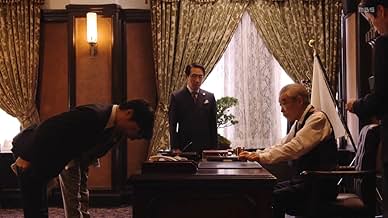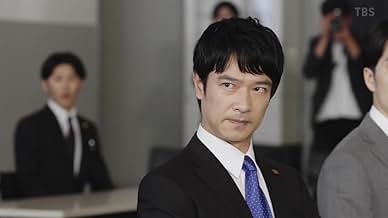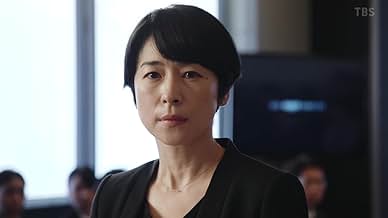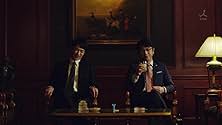CALIFICACIÓN DE IMDb
8.4/10
2.5 k
TU CALIFICACIÓN
Agrega una trama en tu idiomaAn idealistic banker takes on corruption and wrongdoing at his corporate bank. He must use his financial expertise, his instincts about human nature, and his skills of improvisation to try t... Leer todoAn idealistic banker takes on corruption and wrongdoing at his corporate bank. He must use his financial expertise, his instincts about human nature, and his skills of improvisation to try to stay one step ahead of his powerful enemies.An idealistic banker takes on corruption and wrongdoing at his corporate bank. He must use his financial expertise, his instincts about human nature, and his skills of improvisation to try to stay one step ahead of his powerful enemies.
- Premios
- 1 premio ganado y 2 nominaciones en total
Explorar episodios
Argumento
¿Sabías que…?
- TriviaThe most-watched series in Japan with a 42.2 share of the audience, the TV serial Hanzawa Naoki, made its entry overseas starting with Taiwan and Hong Kong. The collection from the TV episodes and the popularity poll for the show has achieved the highest rating in three decades of Japanese television drama!
Opinión destacada
This is said to be the most popular TV drama in Japan in recent years. After watching the whole series of 10 episodes, I kind of understand why it is so popular.
For one thing, it helps all the suffering salary men in Japan who work hard to say what they want to but are afraid to say. It helps the repressed to voice.
Secondly, it values the hardworking small enterprises which went out of business since the bubble burst in Japan. They are the people who actually produce goods instead of playing number games and making our assets evaporate.
In a fast changing and finance-oriented society, Hanzawa brings back what we once lost – care for fellow human in his capacity no matter who they are.
I would not say it is first class but it is very worth watching. More observation:
It is like a Japanese period drama – with all the important people marching and turning at corners and then a shogun – the branch head. Then all the tricks and treats and allies. It is the same in the old days or now, in Japan or in China.
It is also like a samurai drama where Hanzawa is defending his own pride, not loyalty to his shogun, but to his father's human philosophy, which makes it more appealing to the audience, even if they are not in banking.
There seems to be a lot of group pressure – from above to the lower ranking salary men so that life is tough even only for survival. You have to be so careful of what you do and what you say, even for the wives too who had to gather with other wives: a lot of hypocrisy in the sense that they look harmonious but lots of masking and competition within. It will tougher if you want to survive with dignity and pride, not to mention your sense of achievement.
Ranking is extremely important in the company and within the wives. Lots of pressure to conform to various rule and customs.
Hence cohort support is very strong when they had to fight against this ranking system.
Marriage and work life seems to be very different: men usually do not talk about work at home. There seems to be lots of secrets (many unnecessary) among couples and hence they cannot vent and might develop into many possible illness. A crook can be such a loving father. Hence the men are under a lot of pressure in Japan when he is the sole bread earner and he cannot vent even at home. No wonder they died earlier.
All the wives (except Owada's) are very supportive and understanding even though they do not know what their husband do at work. There is much to learn from them!
At least in this drama, all deeds are very instrumental – all action are in exchange for something else – except for help among cohorts. Even presents from wife Hana was kind of a repay for his hardwork. Where is the unconditional giving and love?
The crooks are too one-dimensional. I am sure they are also human on one side which would make the story more convincing.
Hanzawa is confrontational, which is the exact opposite of the traditional Japanese upbringing of harmony. Maybe it is challenging the Japanese tradition, and bringing out lots of unfulfilled desires among Japanese salary men thus they all love it.
In terms of the script, in every episode there is a little surprise with new information. It works like a suspense movie where it naturally draws your attention and you cannot let go.
It seems the Japanese value long-term relationships very much: cohort, the reporter from Osaka, the enemy. They have good memories of people who are nice or nasty to them and they act accordingly. So do not mess with them! If you are nice to them, they will be nice to you and vice versa. On that point I am similar!
Everyone seems to dread transfer. But at least you are still under payroll and in a multinational corporation, working as an expat receive special allowance and is seen as a ladder to career advancement unless you are transferred to some remote area and would not learn anything new, like in ancient China. But then many great literature was written when the author was transferred to these remote areas.
Teruyuki Kagawa, who played Ohwada, is an excellent actor compared to Masato Sakai who played Hanzawa. They have worked together in Key of Life (2012) and in that movie, the difference is even more obvious. http://www.imdb.com/title/tt2078599/reviews-1
For one thing, it helps all the suffering salary men in Japan who work hard to say what they want to but are afraid to say. It helps the repressed to voice.
Secondly, it values the hardworking small enterprises which went out of business since the bubble burst in Japan. They are the people who actually produce goods instead of playing number games and making our assets evaporate.
In a fast changing and finance-oriented society, Hanzawa brings back what we once lost – care for fellow human in his capacity no matter who they are.
I would not say it is first class but it is very worth watching. More observation:
It is like a Japanese period drama – with all the important people marching and turning at corners and then a shogun – the branch head. Then all the tricks and treats and allies. It is the same in the old days or now, in Japan or in China.
It is also like a samurai drama where Hanzawa is defending his own pride, not loyalty to his shogun, but to his father's human philosophy, which makes it more appealing to the audience, even if they are not in banking.
There seems to be a lot of group pressure – from above to the lower ranking salary men so that life is tough even only for survival. You have to be so careful of what you do and what you say, even for the wives too who had to gather with other wives: a lot of hypocrisy in the sense that they look harmonious but lots of masking and competition within. It will tougher if you want to survive with dignity and pride, not to mention your sense of achievement.
Ranking is extremely important in the company and within the wives. Lots of pressure to conform to various rule and customs.
Hence cohort support is very strong when they had to fight against this ranking system.
Marriage and work life seems to be very different: men usually do not talk about work at home. There seems to be lots of secrets (many unnecessary) among couples and hence they cannot vent and might develop into many possible illness. A crook can be such a loving father. Hence the men are under a lot of pressure in Japan when he is the sole bread earner and he cannot vent even at home. No wonder they died earlier.
All the wives (except Owada's) are very supportive and understanding even though they do not know what their husband do at work. There is much to learn from them!
At least in this drama, all deeds are very instrumental – all action are in exchange for something else – except for help among cohorts. Even presents from wife Hana was kind of a repay for his hardwork. Where is the unconditional giving and love?
The crooks are too one-dimensional. I am sure they are also human on one side which would make the story more convincing.
Hanzawa is confrontational, which is the exact opposite of the traditional Japanese upbringing of harmony. Maybe it is challenging the Japanese tradition, and bringing out lots of unfulfilled desires among Japanese salary men thus they all love it.
In terms of the script, in every episode there is a little surprise with new information. It works like a suspense movie where it naturally draws your attention and you cannot let go.
It seems the Japanese value long-term relationships very much: cohort, the reporter from Osaka, the enemy. They have good memories of people who are nice or nasty to them and they act accordingly. So do not mess with them! If you are nice to them, they will be nice to you and vice versa. On that point I am similar!
Everyone seems to dread transfer. But at least you are still under payroll and in a multinational corporation, working as an expat receive special allowance and is seen as a ladder to career advancement unless you are transferred to some remote area and would not learn anything new, like in ancient China. But then many great literature was written when the author was transferred to these remote areas.
Teruyuki Kagawa, who played Ohwada, is an excellent actor compared to Masato Sakai who played Hanzawa. They have worked together in Key of Life (2012) and in that movie, the difference is even more obvious. http://www.imdb.com/title/tt2078599/reviews-1
- Kicino
- 15 oct 2013
- Enlace permanente
Selecciones populares
Inicia sesión para calificar y agrega a la lista de videos para obtener recomendaciones personalizadas
- How many seasons does Hanzawa Naoki have?Con tecnología de Alexa
Detalles
- Tiempo de ejecución54 minutos
- Color
- Mezcla de sonido
- Relación de aspecto
- 1.78 : 1
Contribuir a esta página
Sugiere una edición o agrega el contenido que falta

Principales brechas de datos
What is the French language plot outline for Naoki Kanzawa (2013)?
Responda





















